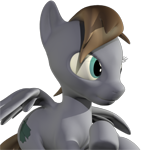Well, I have a bit of a question, that could help my technique (If this is the wrong board, please move this post).
I'd call my synths okay-sounding. I like them, they're capable of producing nice licks, and such. Only problem is that I don't know how to use them, or, for that matter, how most electronic songs are supposed to sound. This is where my question comes in.
Are there any good artists that I could look to to get the basics of songs, or learn different forms? Who do you guys listen to? I want to get better, but to do that, I have to know more about electronic music, first. Please help.
Influences
9 posts
• Page 1 of 1
Re: Influences
In terms of synths, Tombstone is amazing at getting LOTS of different synths to work together well, all playing different things. Same with Glaze (inb4 somebody says those are the obvious ones). Honestly, it all depends on genre. Since I listen to mostly trance, hip hop and dubste, I use people like Alex S, TheAgileDash, Yelling at Cats, and Jackle App for inspiration when I'm trying to get all my instruments to play together well. I'd say this was the hardest hump to get over when it came to learning (ha @ implying I even know what I'm doing), so I know that feel. Especially since I had only just found electronic music when I began producing. >_>
If you don't already do it: next time you get some free time or are feeling uninspired, pick one or more of your favorite songs and listen through it a couple times, each time focusing on a different instrument/type of instrument. Just listen and see how they do what they do to make it sound good. You'd be amazed at what you find.
If you don't already do it: next time you get some free time or are feeling uninspired, pick one or more of your favorite songs and listen through it a couple times, each time focusing on a different instrument/type of instrument. Just listen and see how they do what they do to make it sound good. You'd be amazed at what you find.
-

Legion - Posts: 469
- Joined: 10 Mar 2012 22:46
- Location: Detroit
Re: Influences
In terms of structure and sound design, I've taken a good bit of influence from Noisia (though it's sort of hard to hear in my tracks, go figure). They're basically the holy trinity of bass music.
-

colortwelve - Posts: 1187
- Joined: 18 Feb 2012 12:55
- Location: Los Angeles, CA
Re: Influences
Deadmau5 and Skrillex (I don't to start a hate thread) are arguably the most heard of electronic artists and both their productions are top notch quality. They both have given me a lot of inspiration and I often compare my tracks quality wise to theirs. I also suggest Kraftwerk espicially their live preformances as they were one of the first electronic musicians of their kind and still popular to this day (They have been around for over 40 years if I remeber correctly).
Getting synths to work together is largely to do with EQing, cut away a lot of frequencies to give them all room so they don;t fight for space. It will sound bad when you solo the synth but when they all play together you won't hear much of a diffrence.
Getting synths to work together is largely to do with EQing, cut away a lot of frequencies to give them all room so they don;t fight for space. It will sound bad when you solo the synth but when they all play together you won't hear much of a diffrence.
4thImpulse's Youtube
Intro to DJing --- Guide on giving feedback --- Most detailed frequency chart you will ever see
Intro to DJing --- Guide on giving feedback --- Most detailed frequency chart you will ever see
-

the4thImpulse - Posts: 1578
- Joined: 22 Feb 2012 17:10
- Location: Kelowna, B.C.
- Primary: Ableton Live 8
- Cutie Mark: Blank flank
Re: Influences
You should try looking into some Prince's New Power Generation and The Revolution era stuff. Specially with The Revolution.
-

Trillionage - Posts: 294
- Joined: 28 Apr 2012 22:07
Re: Influences
I'd highly suggest looking up a lot of analogue producers, such as Simon Posford of Shpongle and Hallucinogen, Richard James of Aphex Twin, or Liam Howlett of Prodigy.
Considering a lot of synths and effects are modeled after analogue instruments, there's a wealth of knowledge that revolves around mixing, sends, and mixing board techniques, that are often overlooked by those (like most of us) who use purely digital instruments.
Study their workflow, how they compose and create their own sounds, etc. Then try and limit yourself to an analogue mindset, or in other words, "Would this track be physically possible or impossible for an analogue musician to recreate?"
Electronic music has come a far way since the analogue days, but a lot of musicians (myself included) get caught up with all the knobs and buttons each synth contains, and the end result ends up being far more overbearing and unmanageable.
Analogue musicians look at how they can work with what they got.
Digital musicians look at what more they can work with.
Thinking in an analogue mindset limits you to focusing on fewer tracks, fewer effects, and more on the composition itself. As someone else mentioned in the tips thread: "Quality over Quantity," and that goes for both how many tracks you have, and how much you're manipulating each track.
Considering a lot of synths and effects are modeled after analogue instruments, there's a wealth of knowledge that revolves around mixing, sends, and mixing board techniques, that are often overlooked by those (like most of us) who use purely digital instruments.
Study their workflow, how they compose and create their own sounds, etc. Then try and limit yourself to an analogue mindset, or in other words, "Would this track be physically possible or impossible for an analogue musician to recreate?"
Electronic music has come a far way since the analogue days, but a lot of musicians (myself included) get caught up with all the knobs and buttons each synth contains, and the end result ends up being far more overbearing and unmanageable.
Analogue musicians look at how they can work with what they got.
Digital musicians look at what more they can work with.
Thinking in an analogue mindset limits you to focusing on fewer tracks, fewer effects, and more on the composition itself. As someone else mentioned in the tips thread: "Quality over Quantity," and that goes for both how many tracks you have, and how much you're manipulating each track.
DAW: Cubase 6.5, Ableton Live 8
Preferred Genre: Industrial/Trance
Hardware: Schecter Diamond Series Bass, Yamaha Acoustic Guitar, BP355 Effects Pedal, Keystudio 49K Keyboard, Akai APC40, Korg nanoKEY2 25k Keyboard
Preferred Genre: Industrial/Trance
Hardware: Schecter Diamond Series Bass, Yamaha Acoustic Guitar, BP355 Effects Pedal, Keystudio 49K Keyboard, Akai APC40, Korg nanoKEY2 25k Keyboard
-

Navron - Global Moderator
- Posts: 955
- Joined: 14 Nov 2011 21:28
- OS: Windows 7
- Primary: Cubase 6.5
Re: Influences
For me, I listen to Renard and Futret, and pick apart what's good and what's bad in their music, the craziness and impossibility of it all, to quickly learn what works and what doesn't, and how to make something wrong sound right. Neutral Milk Hotel is really nice for their lyrics. Skrillex and xCore is good, same with KOAN Sound and Loadstar and everyone else on the UKF-Bass Culture album (recommended purchase for anyone getting into Electronic music).
And Knife Party. Oh GOD YES. AND JUSTICE.
I'd say obtaining Cross by Justice is a necessity, it's just a really nice album with a lot of hints towards good song structure.
And Knife Party. Oh GOD YES. AND JUSTICE.
I'd say obtaining Cross by Justice is a necessity, it's just a really nice album with a lot of hints towards good song structure.
Skype:vlad_is_kewl
http://www.youtube.com/user/vladnuke?feature=mhee
http://vladnuke.tumblr.com/
http://shibacrew.bandcamp.com/album/shiba-crew-fall-season-2013
DAWs: FL 11, Live 9
VSTs: K8, free plugins.
Friend code: 0146-9410-4436
http://www.youtube.com/user/vladnuke?feature=mhee
http://vladnuke.tumblr.com/
http://shibacrew.bandcamp.com/album/shiba-crew-fall-season-2013
DAWs: FL 11, Live 9
VSTs: K8, free plugins.
Friend code: 0146-9410-4436
-

vladnuke - Posts: 1033
- Joined: 29 Feb 2012 19:47
- Location: Los Angeles
Re: Influences
Just listen to the artists you like and overanalyze their sounds, I mean we all have different influences because we all like different genres, styles and songs.
For me my main inspirations would be Receptor, Noisia, Rabbit Killer, Neonlight and KOAN sound, but also some guys from this community like Addictia, ArtAttack and Whitetail (probably because I talk so damn much with these guys)
For me my main inspirations would be Receptor, Noisia, Rabbit Killer, Neonlight and KOAN sound, but also some guys from this community like Addictia, ArtAttack and Whitetail (probably because I talk so damn much with these guys)
- Icky
- Posts: 272
- Joined: 30 Jun 2011 09:23
9 posts
• Page 1 of 1
Who is online
Users browsing this forum: No registered users and 0 guests
